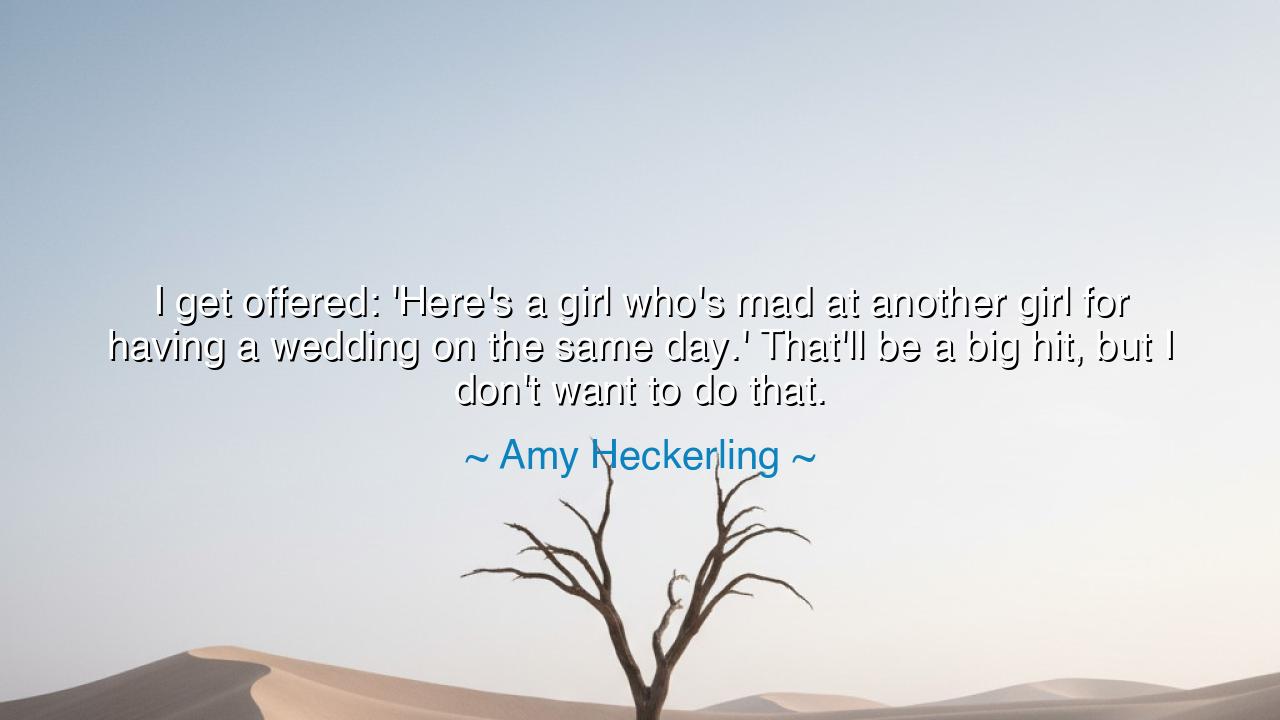
I get offered: 'Here's a girl who's mad at another girl for
I get offered: 'Here's a girl who's mad at another girl for having a wedding on the same day.' That'll be a big hit, but I don't want to do that.






The words of Amy Heckerling—“I get offered: ‘Here’s a girl who’s mad at another girl for having a wedding on the same day.’ That’ll be a big hit, but I don’t want to do that.”—reveal the wisdom of an artist who refuses to trade truth for shallow conflict. In her voice there is weariness with the trivial, with the endless repetition of stories that pit women against each other over weddings and rivalries that diminish both. She recognizes the temptation of easy success, the “big hit”, yet she chooses instead the harder road of integrity.
The image of two women clashing over the date of a wedding is symbolic of how society often delights in manufacturing competition where there need be none. Instead of celebrating union, love, or the joy of families, the focus becomes jealousy and resentment. Heckerling, with the insight of one who has seen beyond the glitter of popularity, rejects this narrative, knowing that it serves neither art nor truth, but only the appetite of the crowd for shallow spectacle.
History gives us the story of Sophocles, who, when writing his tragedies, could have chosen to flatter the people with light comedies or political satires that would win quick favor. Instead, he dared to speak of fate, suffering, and divine justice. His choice was not for popularity, but for depth—and though many might have preferred easy laughter, it is his works that endure as eternal mirrors of the human soul. So too does Heckerling remind us that the artist’s duty is not to chase fleeting applause but to carve truth that will last.
The lure of the “big hit” is like sweet wine: intoxicating, but fleeting, leaving the artist hollow once the cheers fade. To turn away from it requires strength, the kind of strength that values creation as a sacred act rather than a commodity. By rejecting the trivial, Heckerling aligns herself with those who see art not as entertainment alone, but as a reflection of the human condition, worthy of dignity and purpose.
Therefore, O listener, take this lesson: not every opportunity must be seized, and not every story worth telling is one that the crowd demands. The true artist must discern between what merely sells and what truly speaks. The wedding, in its deepest essence, is about union, love, and transformation—it is not meant to be reduced to pettiness and rivalry. Choose always the higher path, even if it wins fewer hands clapping, for in the end, the works built on integrity will stand while the cheap victories crumble into dust.






PBYen Pham Bao
I love that Amy Heckerling is stepping away from the clichéd wedding drama that often gets pushed as entertainment. It shows a level of self-awareness and a desire to bring something more meaningful to the table. But it makes me wonder—how much of this type of conflict is still out there in other forms of media? Is there an audience that still craves that kind of petty drama, or are we ready for a shift in how weddings and relationships are portrayed?
WUWorld Under
Amy Heckerling's refusal to take on the typical wedding drama trope is an interesting point. I agree that it’s overdone, but I also wonder if it’s still popular because it adds an element of conflict that’s often used to drive a story. It makes me think about how weddings are portrayed in the media. Should we be moving away from the drama and focusing more on the real emotions and connections that come with weddings?
MNTUONG MINH NHAT
I can totally understand why Amy Heckerling doesn’t want to do a storyline about two girls fighting over a wedding day. It’s a tired trope that doesn’t bring anything new to the table. I think she’s right to focus on more interesting and authentic stories. But I wonder—why do you think these kinds of petty conflicts still dominate so much of mainstream media? Is it simply easier for audiences to relate to drama like this?
ANANH NHI
Amy Heckerling's stance on not wanting to take on the stereotypical 'catty wedding drama' is refreshing. It feels like there’s a growing movement away from those tired, overly dramatic storylines that often focus on petty conflicts. I wonder, though, does the entertainment industry still push these kinds of narratives because they’re easy and sell well? Are we moving toward more authentic, meaningful storytelling in the realm of weddings and relationships?